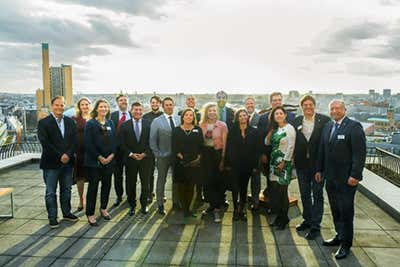Morrison & Foerster and the Motion Picture Association (MPA) Co-Host Panel on Sustainability in Film Production During 2020 Berlin International Film Festival
|
BERLIN (February 25, 2020) – Morrison & Foerster, a leading global law firm, together with the Motion Picture Association (MPA), have continued their long-term cooperation and co-hosted another high-profile panel session on “Film Goes Green – Sustainability in Film Production”, on the occasion of the 70th Berlin International Film Festival.
The panel session, attended by more than 250 guests, was organized and opened by Christiane Stuetzle, partner and Chair of Morrison & Foerster’s Global Film & Entertainment Practice, and Ambassador Charles Rivkin, Chairman and CEO of the Motion Picture Association.
In an introductory note, Christiane Stuetzle referenced “The Green New (Film) Deal” and gave an overview of the various German, European and U.S. measures that have already been undertaken to enhance green filming, including the “Joint Declaration for Sustainable Film and Series Production” launched by Federal Government Commissioner for Culture and Media Monika Grütters.
In the keynote speech, Ambassador Charles Rivkin said that “the members of the film and television sector have always been drivers of creative and technological innovation. We are uniquely positioned to tackle almost any challenge, sustainability included.” He highlighted how the MPA member companies champion pro-environmental policies each and every day, from conserving energy to reducing waste. Rivkin also outlined that all major Hollywood studios – like many European producers – have for long been implementing measures for green filming and earned Gold or Green Seals, issued by the Environmental Media Association.
After this inspiring keynote speech, the panel kicked off with actress and Filmmakers for Future signatory Luisa-Céline Gaffron. Luisa emphasized that green shooting is key for her. For example, if getting on a plane for a film production cannot be avoided, she does compensate, if needed, out of her own pocket. Peter Dinges, the CEO of the German Federal Film Board (FFA), outlined that sustainability will play a bigger role in the German Federal Film act which is currently under revision, and made it clear that “sustainability is not an option, it is a must.” Oliver Vogel, producer and Chief Creative Officer of Bavaria Fiction, explained that Bavaria has been actively implementing green shooting measures since 2012, up to the point where they are producing their own electricity. Álvaro Longoria of Morena Films and President of the European Producers Club – who just produced the impressive documentary “Sanctuary” with Javier Bardem, which shows the impact of climate change in the Antarctic – also alerted the audience to the fact that time is of the essence. Further, he emphasized the importance of harmonized standards, a goal that the European Producers Club is tying to its first European Charter for Green Shooting. Peter Flanigan, Senior Legal Counsel at Paramount Pictures, who had already published an article on “The Environmental Cost of Filmmaking” back in 2002, outlined that in the U.S., green shooting measures are more or less harmonized, based on the checklist issued by the Producers Guild of America, among other criteria. Jimmy Keeping, Environmental Coordinator for Warner Bros Pictures UK, and Korina Gutsche, sustainability consultant in Germany, then both gave practical examples of green shooting measures in the day-to-day business of a film production, including site-specific waste management, trialing innovative technologies, and designing and applying carbon tracking tools.
Another perspective was given by Ali Russel, Chief Marketing Officer of Extreme E and Director of FIA Formula E. Ali shared a trailer for the fascinating documentary “And we go green” on Formula E car racing and the innovative development of car batteries which, beyond Formula E, also contributes to the general enhancement of batteries for electric cars. The documentary, produced by Leonardo DiCaprio, premiered in Cannes in 2019 and combines passion for Formula E car racing with sustainability, transporting the sustainability message to audiences which might otherwise not have been reached. The panel concluded with Wayne Borg, Managing Director Media, Culture, Entertainment & Fashion Industries at NEOM. He introduced the NEOM project, a futuristic city on the Red Sea in northwestern Saudi Arabia where sustainability will be the first and foremost goal, and be implemented in a legacy-free environment.
Following a lively discussion with all panelists and the audience, Christiane Stuetzle and Stan McCoy wrapped up the panel by concluding that film is about storytelling and stories should encourage people to contribute to a more sustainable world. Films speak a global language, and so should the standards for sustainability. Christiane Stuetzle closed the event by saying that “last but not least, the film and TV sector can serve as a role model for other industries, also in the field of sustainability.”
The panel discussion was followed by a reception with more than 350 high-profile guests from the international film & entertainment industry, using the opportunity to continue the dialogue and leverage the networking platform.
- Christiane StuetzleCo-Chair Global Film & Entertainment Practice
